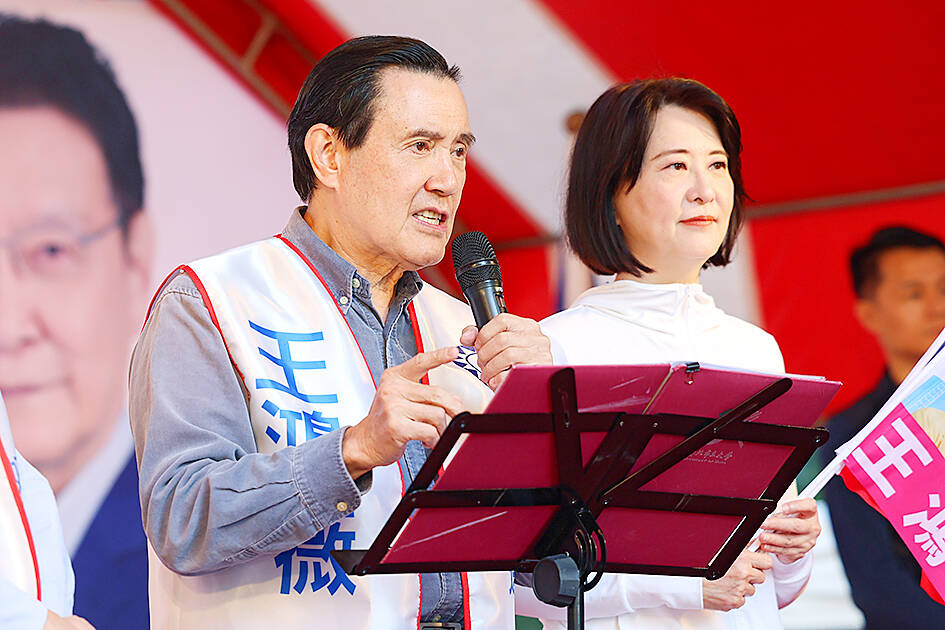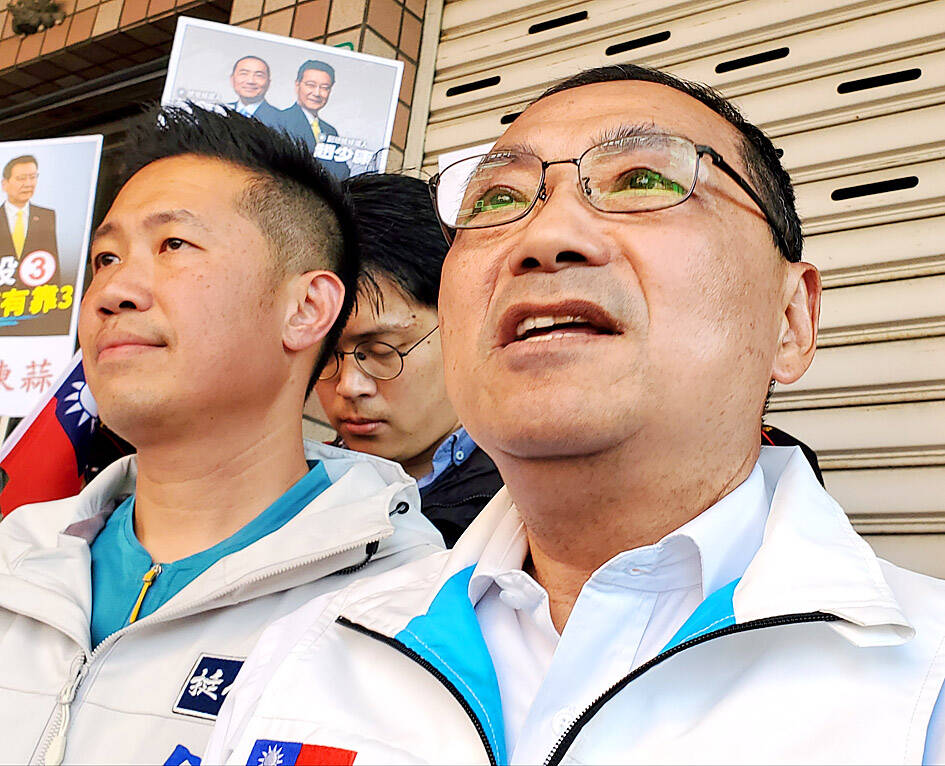New Taipei City Mayor Hou You-yi (侯友宜), the Chinese Nationalist Party’s (KMT) presidential candidate, yesterday distanced his campaign from comments made by former president Ma Ying-jeou (馬英九), who said that Taiwan “can never win against China,” so should reduce its defense spending.
Ma made the comments on Saturday during an interview with Deutsche Welle in which he defended previous comments that the duration of mandatory military service and the defense budget should be four months and 2.5 percent of GDP respectively.
The view that Taiwan should have defense capabilities to fend off a Chinese invasion until the US and Japan can send aid is “too optimistic,” Ma said, adding that the US was defeated by China 18 times in wargames simulating a conflict over Taiwan.

Photo: CNA
On the sidelines of a campaign event in Kaohsiung, Hou yesterday said: “Ma’s thinking differs from my own.”
“My consistent policy is the 3D strategy of deterrence, strengthening national defense and armaments, and increasing self-defense capabilities while pursuing dialogue and discussion,” Hou said. “I do not harbor unrealistic ideas about China’s intentions for Taiwan.”
If elected, he would stubbornly defend Taiwan’s democracy and freedom while opposing Beijing’s “one country, two systems” formula for unifying with Taiwan, he said.

Photo: Chen Wen-chian, Taipei Times
Ma in the interview said he believes Taiwan does not need any military expenditure beyond the levels he had authorized as president.
“No matter how much you defend yourself, you can never fight a war with the mainland, you can never win,” he said.
Asked if he believes Chinese President Xi Jinping (習近平) can be trusted, Ma said: “As far as cross-strait relations go, you have to.”
“I do not believe he is pushing for unification,” he added.
Asked about Chinese balloons and warplanes approaching Taiwan’s airspace, Ma said that Beijing has resorted to such actions due to the independence stance of Vice President William Lai (賴清德), the Democratic Progressive Party’s presidential candidate.
Are the balloons collecting weather data or intelligence? Ma asked, adding that Taiwan was not likely to accept flyovers by spy balloons and would shoot them down.
Ma also refused to comment on US President Joe Biden’s characterization of Xi as a dictator, saying: “The term is not important in cross-strait relations because we have to create a situation that we can deal with each other peacefully.”
Hou’s running mate, Broadcasting Corp of China chairman Jaw Shaw-kong (趙少康), yesterday said that Ma does not represent Hou.
People should not look outside of Hou’s comments to understand his views, Jaw said on the sidelines of a campaign event at an animal shelter in New Taipei City.
“Mutual trust is important to conduct cross-strait dialogue, but that trust is not unconditional,” he said. “We need to assess whether the other side is sincere in its comments and observe whether its actions are harmful to us.”
The Constitution recognizes that there is only “one China,” but it is not a timetable that demands the government to achieve a specific state at a designated time, he said.

Beijing could eventually see a full amphibious invasion of Taiwan as the only "prudent" way to bring about unification, the US Department of Defense said in a newly released annual report to Congress. The Pentagon's "Annual Report to Congress: Military and Security Developments Involving the People's Republic of China 2025," was in many ways similar to last year’s report but reorganized the analysis of the options China has to take over Taiwan. Generally, according to the report, Chinese leaders view the People's Liberation Army's (PLA) capabilities for a Taiwan campaign as improving, but they remain uncertain about its readiness to successfully seize

Taiwan is getting a day off on Christmas for the first time in 25 years. The change comes after opposition parties passed a law earlier this year to add or restore five public holidays, including Constitution Day, which falls on today, Dec. 25. The day marks the 1947 adoption of the constitution of the Republic of China, as the government in Taipei is formally known. Back then the Chinese Nationalist Party (KMT) governed China from Nanjing. When the KMT, now an opposition party in Taiwan, passed the legislation on holidays, it said that they would help “commemorate the history of national development.” That

Taiwan has overtaken South Korea this year in per capita income for the first time in 23 years, IMF data showed. Per capita income is a nation’s GDP divided by the total population, used to compare average wealth levels across countries. Taiwan also beat Japan this year on per capita income, after surpassing it for the first time last year, US magazine Newsweek reported yesterday. Across Asia, Taiwan ranked fourth for per capita income at US$37,827 this year due to sustained economic growth, the report said. In the top three spots were Singapore, Macau and Hong Kong, it said. South

Snow fell on Yushan (Jade Mountain, 玉山) yesterday morning as a continental cold air mass sent temperatures below freezing on Taiwan’s tallest peak, the Central Weather Administration (CWA) said. Snowflakes were seen on Yushan’s north peak from 6:28am to 6:38am, but they did not fully cover the ground and no accumulation was recorded, the CWA said. As of 7:42am, the lowest temperature recorded across Taiwan was minus-5.5°C at Yushan’s Fengkou observatory and minus-4.7°C at the Yushan observatory, CWA data showed. On Hehuanshan (合歡山) in Nantou County, a low of 1.3°C was recorded at 6:39pm, when ice pellets fell at Songsyue Lodge (松雪樓), a